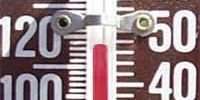Heat
 4:15
Jeff Rice
4:15
Jeff Rice
The birds and animals, and even insects hide.
Broadcast: Aug 15 2001 on NPR All Things Considered Subjects: Environment
Interview: Tucson, Arizona, residents share desert heat experiences
August 15, 2001 from All Things Considered
LINDA WERTHEIMER, host: Well, it's not 1,200 degrees, but the heat this time of year in the American Southwest is blistering. Daytime temperatures rarely drop below 100 degrees in the desert. Jeff Rice asked residents of Tucson, Arizona, to reflect on life under the blazing sun and created this montage.
Unidentified Man #1: The desert really melts things down and burns away the unimportant.
(Soundbite of man's comment enhanced with background music)
Unidentified Man #1: The desert really melts things down and burns away the unimportant. The desert really melts things down and burns away the unimportant.
Unidentified Woman #1: As a kid, I remember us walking along the roadways and seeing the pavement bubble up, because that's how hot it was out there.
Unidentified Man #2: I've stood in valleys in June when it was 115 degrees, and there's no one there, and all the insects have gone underground or died or fled, and the birds don't move through the sky until dusk, and you hear this sound, this thumping. And then you realize for the first time since you've been on earth, you're hearing your own body, your blood, your heart.
Unidentified Meteorologist: ...extended seven-day forecast for the valley. It's going to be a hot one today, so the air conditioners, they will be cranking up this afternoon. One hundred ten will be our high today under sunny skies, of course, so no significant changes in the weather pattern. Continued sunny, hot and dry for at least the next seven days.
Unidentified Woman #2: Many people still tend to follow the old practices in the summertime, you know, getting up very, very early. And in the afternoons, older people would sleep, but younger people, literally, they would just sit and sort of let the body temperature just try and be stable. It would be this silence not only of lack of sound, but also, I think, the silence of heat.
(Soundbite of recording)
Unidentified Woman #3: The time is 1:29. Current temperature: 109 degrees.
Unidentified Man #3: It's absolutely languid, slow flowing. For me, that feeling when the body starts to dissolve the boundaries of skin and your sense of being inside of a form can really melt away with just the right combination of temperature and expanse.
Unidentified Man #4: I've been out here when it hit 125, and at 125, if you had to walk a mile, you consider it life-threatening. So I got to sit in here guzzling water, sitting in, you know, 109, 110 degrees, but I'm OK because I'm not moving. But if you move, you pay.
Unidentified Woman #4: (Through Translator) The sun has moved down that way a bit, and yet, it is so hot. All movement has almost stopped. A fly goes by so slowly. Everything has slowed down. My father is sitting there. His head is tilted back and he's asleep. My sister is laying over there asleep. The dog passes by. He is looking for shade. Everything has slowed down. And yet, the clouds have slowly settled in. `It's raining! It's raining!' My father jumps up. `Run and cover my grain! Run and get the clothes off the line!' Everything is now moving and alive. My sister is up. The dog is up. Everything is now moving and alive.
WERTHEIMER: Our story on desert heat was produced by Jeff Rice and comes to us from HearingVoices.com.
NOAH ADAMS (Host): It's ALL THINGS CONSIDERED from NPR News.

